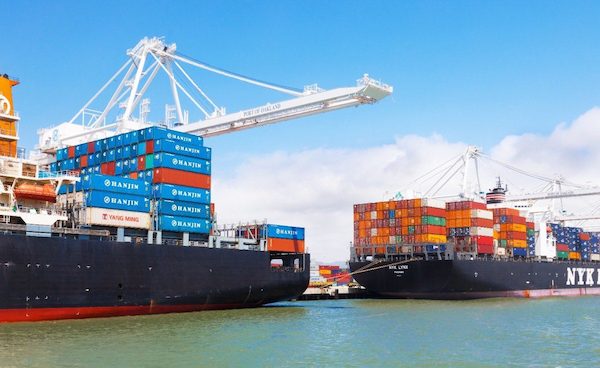Nigeria has lost a staggering $9 billion annually due to the absence of functional ocean-going vessels for affreightment, particularly for crude oil, LEADERSHIP can report.
LEADERSHIP has learned that Nigeria loses out to foreign shipowners who transport crude oil and engage in Ship-to-Ship (STS) transfers, disadvantaging indigenous ship operators in the nation’s coastal waters.
Maritime experts argue that for decades, Nigeria has not benefitted from the carriage of its cargoes, especially crude oil, due to a lack of ocean-going vessels operating in international trade.
They further noted that the country’s lack of ocean-going vessels has led to substantial economic losses.
Speaking to LEADERSHIP, the Advisory Head of Kamany Marine Services Limited, Charles Okorefe, stated that this trend will continue until Nigeria changes its trade terms from Free On Board (FOB) to Cost, Insurance, and Freight (CIF).
According to Okorefe, crude oil is exported on an FOB basis, meaning that the buyer of the crude oil nominates the vessel to transport the crude.
“Nigeria only supplies the crude to the vessel’s tank, and once it removes its hose, Nigeria’s responsibility ends. Nigeria receives payment for the crude oil and then has no further involvement. The buyer assumes responsibility from the loading point, whether from Bonny or Escravos, to the final destination. Any issues with the vessel or the crude are at the buyer’s risk.
“But if it were a CIF arrangement, Nigeria would be responsible for either owning or chartering the vessel that transports its crude oil. In this case, the country would earn freight from the movement of that crude oil, as it would be responsible for delivering the product to its destination before receiving payment for its services. Unfortunately, that is not the current practice.
“Since 1958, when Nigeria began exporting crude oil, the country has not earned freight on crude oil because it trades on an FOB basis. The same applies to our dry cargo as we lack vessels,” Dr Okorefe stated.
He pointed out that Nigeria has lacked ocean-going vessels since the collapse of the Nigerian National Shipping Line (NNSL), adding that it is not profitable for Nigeria to trade its dry cargo on a CIF basis when there aren’t enough cargoes to transport.
“In the crude oil business, even when there is sufficient cargo, we still trade on an FOB basis. This explains why Nigeria continues to lose potential earnings from freight on cargo shipments,” he said.
An indigenous shipowner, who wished to remain anonymous, echoed that Nigeria is losing billions of dollars annually to foreign shipowners because major oil companies refuse to engage indigenous shipowners for crude affreightment.
According to the shipowner, foreign shipowners who control the mother vessels set conditions that exclude local operators from lifting crude, thereby causing Nigeria to lose billions of dollars in freight annually.
He said, “If ocean commerce is developed, built, and expanded as expected, what is $9 billion considering our vast ocean resources? $9 billion is a modest estimate, as the ripple effect reveals that we are losing enormous revenue due to our inability to enforce the Cabotage law.
“The problems stem from indigenous operators’ lack of access to contracts from major oil companies, including NNPC. Major oil companies fail to engage indigenous operators. If companies like NNPC awarded contracts to local operators to provide vessels, banks would be more willing to finance them, seeing that there is cargo.
“Practice makes perfect. If they claim local operators lack capacity, it is inaccurate. We need to continue efforts to build capacity because some local operators are managing their freight excellently,” the anonymous shipowner stated.
He continued, “If we say indigenous operators’ vessels are not suitable, not seaworthy, but then when there is no cargo or contracts, how can they compete?” he asked rhetorically.
“Vessels are built and purchased to be self-financing, maintained, and cared for. It is the revenue from the services provided that is used to maintain the vessel. Indigenous operators are deprived of contracts, while foreign vessel owners bring in additional vessels for STS transfers, often with questionable requirements that are not applicable in our waters,” he stated.
“For instance, if the Nigerian Maritime Administration and Safety Agency (NIMASA) has certified a local vessel as seaworthy, foreign vessel owners have no right to deem it unseaworthy. The flag administration is responsible for regulating vessel standards. Mother vessels set parameters to exclude local operators,” he lamented.
“If mother vessels perform STS transfers in our waters, they have no right to reject local vessels, and they put considerable effort into enforcing this. Trade should ensure exclusivity for cargo goods and services for indigenous operators.
Also speaking, shipping expert Fred Godwin highlighted numerous challenges that have impeded the development of the Nigerian fleet over the years.
Fred argued that the absence of indigenous ocean-going vessels is allowing foreign vessels to dominate the nation’s shipping trade.
According to him, the challenges include ship registration, lack of incentives for operators, trade terms, human capacity, and absence of an institutional framework.
We’ve got the edge. Get real-time reports, breaking scoops, and exclusive angles delivered straight to your phone. Don’t settle for stale news. Join LEADERSHIP NEWS on WhatsApp for 24/7 updates →
Join Our WhatsApp Channel










